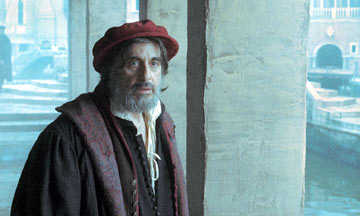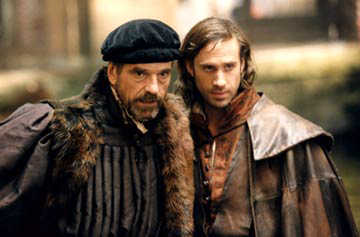

William Shakespeare's The Merchant of Venice is considered a comedy. Michael Radford's William Shakespeare's The Merchant of Venice is a searing portrait of anti-Semitism in Venice in the 16th century. Where's the disconnect? Because of the nature of the character of Shylock, especially after World War II, The Merchant of Venice rightly or wrongly took on a deeper meaning. There are two main groups of thought on the issue. The first is that Shylock is merely the antagonist and that Shakespeare did not mean to inject his play with such vitriol. The second is that this is not the case. Whatever the reason, this is Radford's (Dancing at the Blue Iguana, B. Monkey) interpretation, and while it never makes for compelling viewing, it does remain moderately interesting.
By now the story is familiar to most people. Bassanio (Joseph Fiennes, Sinbad, Luther) wants to woo the beautiful Portia (Lynn Collins, 13 Going on 30, 50 First Dates), but does not have the money. He goes to his friend Antonio (Jeremy Irons, Being Julia, Callas Forever), who also does not have the money. Antonio seeks the help of Shylock (Al Pacino, Gigli, The Recruit), who agrees to lend him the money. The catch is that if Antonio does not return the money with interest, Shylock will take a pound of Antonio's flesh. Ordinarily, any adaptation would then focus on Bassanio's attempts to woo Portia. Radford includes this, but seems to push it to the wayside. Instead, he focuses squarely on the fact that Shylock is Jewish, and does add surprising power and emotion into the court scene near the end where Shylock demands Antonio's flesh.
This is certainly a gorgeous production. Much of the Merchant of Venice was shot in Venice, which lends an amazing amount of credibility to the film. These exteriors are not sound stages or anonymous Eastern European towns, this is Venice. There is a sumptuousness to everything, mixed in with an air of grime, hinting at the dirty underbelly of some of the characters. And the cast acquits themselves well of Shakespeare's difficult iambic pentameter. The only oddity is Pacino. Pacino has done Shakespeare before (Looking for Richard), but he hams it up here. He is playing Al Pacino playing Shylock, yelling and whooping up a storm. It gets pretty distracting, but he does manage to make Shylock a sympathetic character. The world around him disparages him because of his religion. In the beginning of the film, Antonio spits upon him. Radford but some of the treatment of Jews in context, and states that it was illegal to charge interest on lent money, but there is just a disconnect between the story of Antonio and Shylock with that of Bassanio and Portia.